Module 12 Help 模块导学课件
文档属性
| 名称 | Module 12 Help 模块导学课件 | 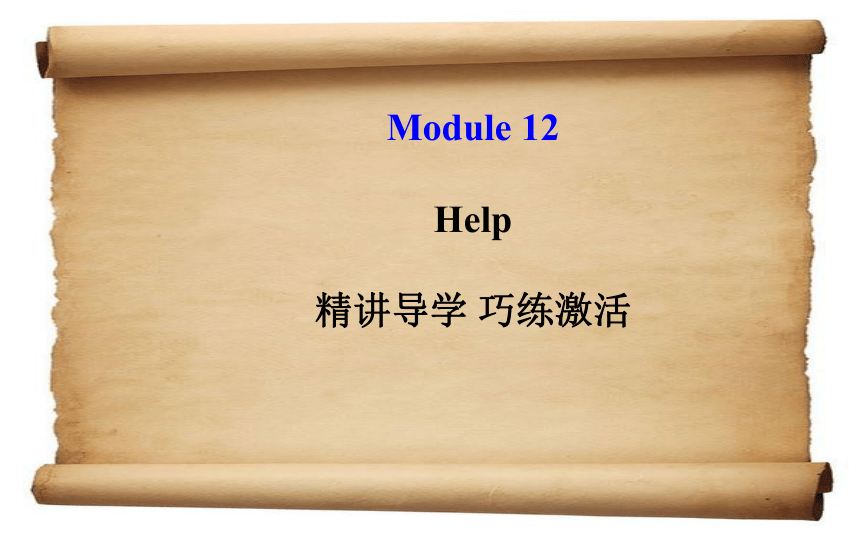 | |
| 格式 | zip | ||
| 文件大小 | 2.6MB | ||
| 资源类型 | 教案 | ||
| 版本资源 | 外研版 | ||
| 科目 | 英语 | ||
| 更新时间 | 2014-11-22 03:12:28 | ||
图片预览


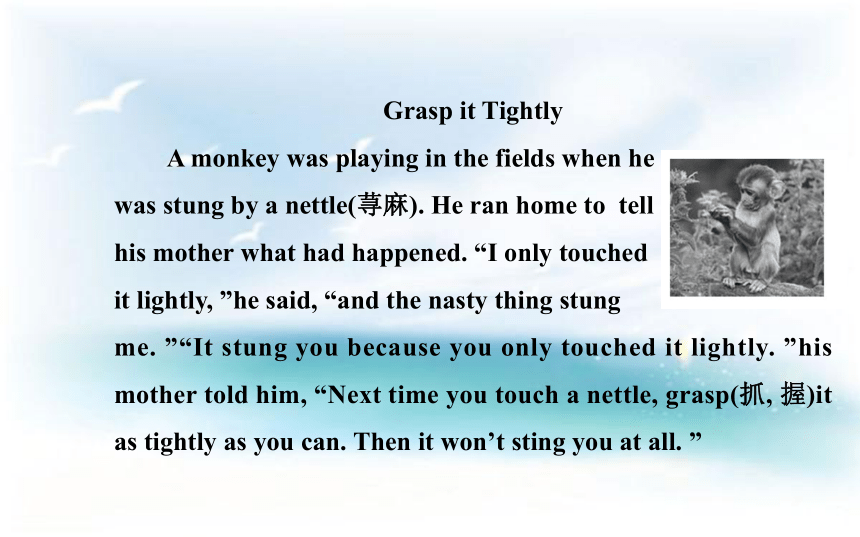
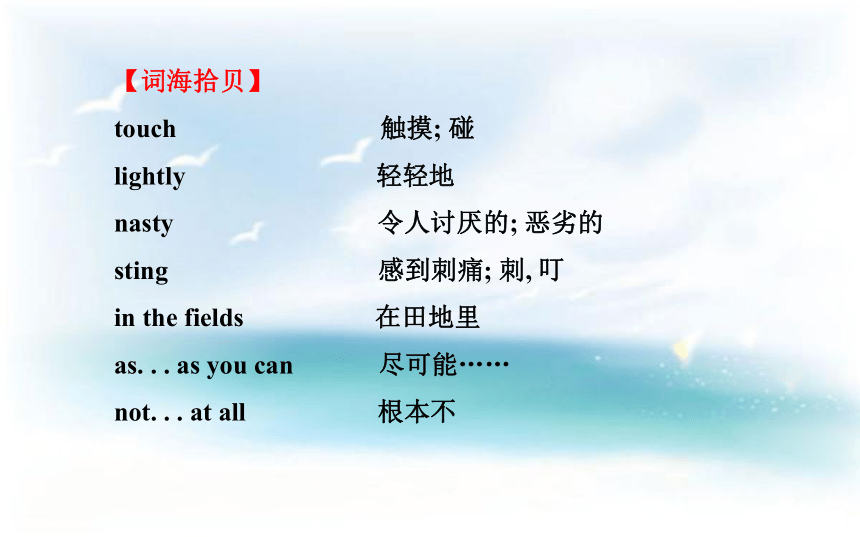

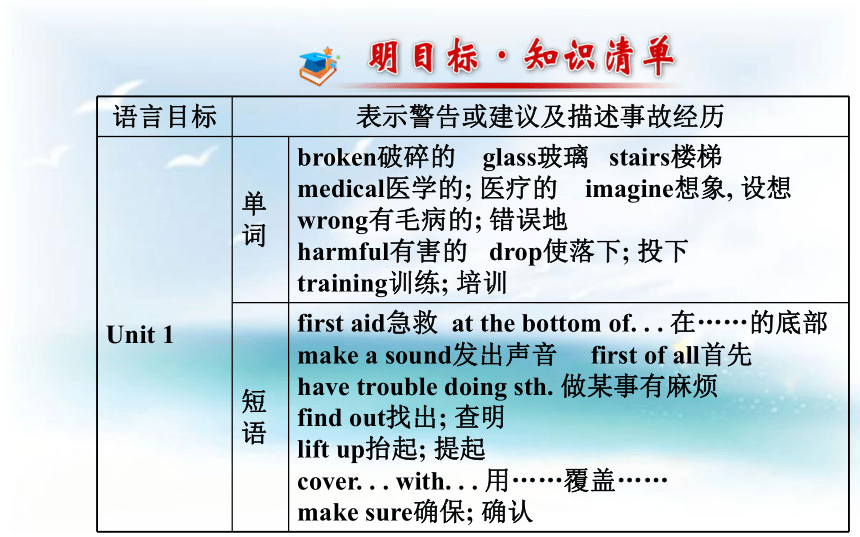
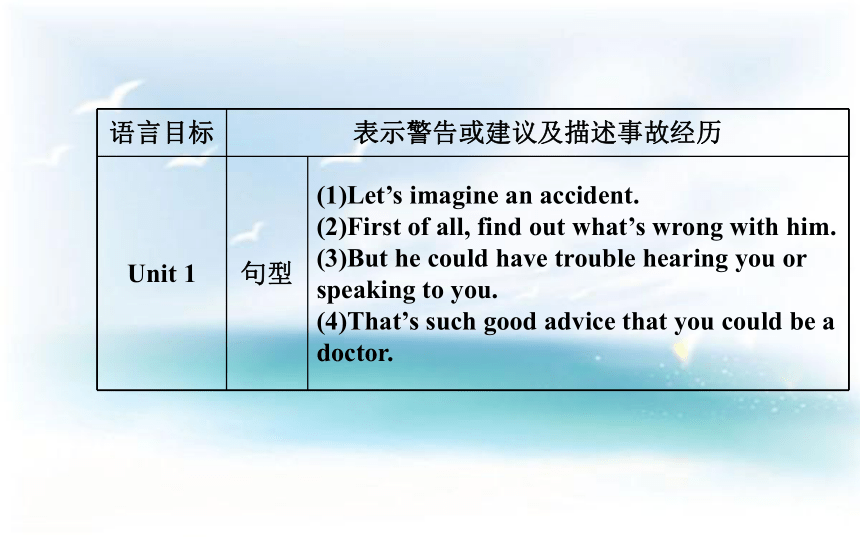
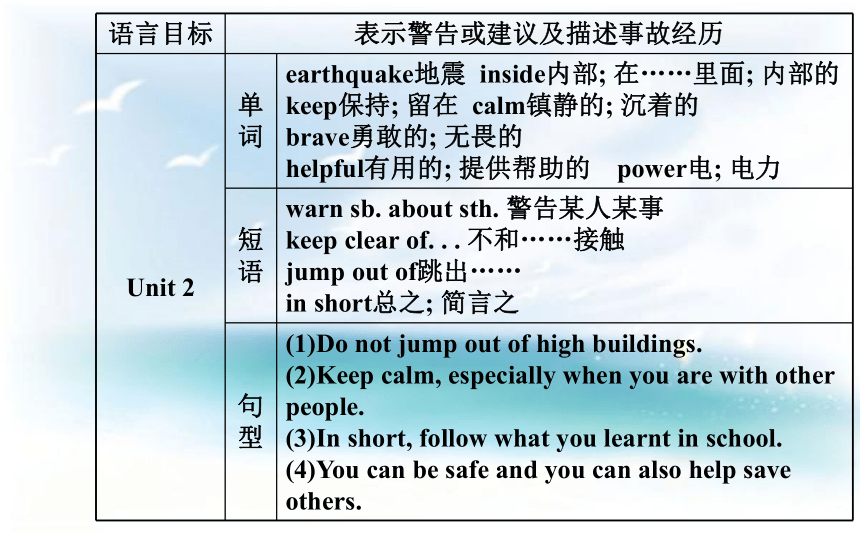
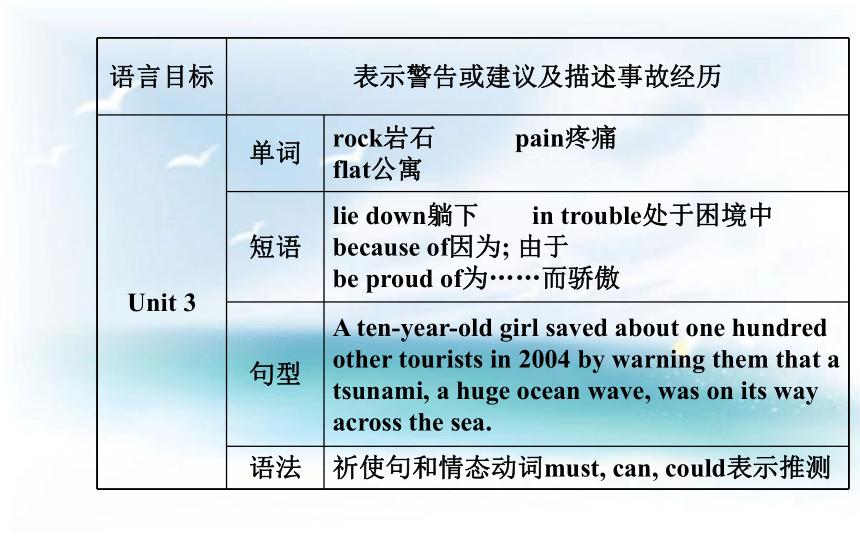
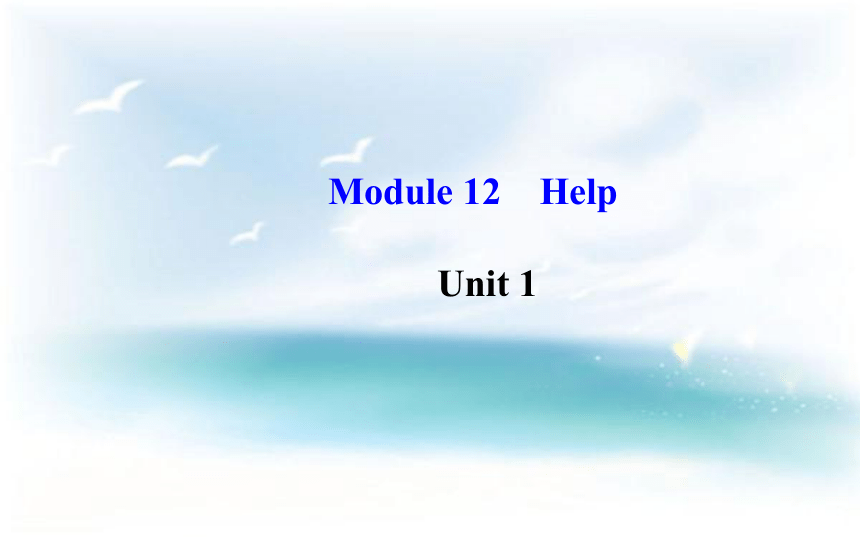
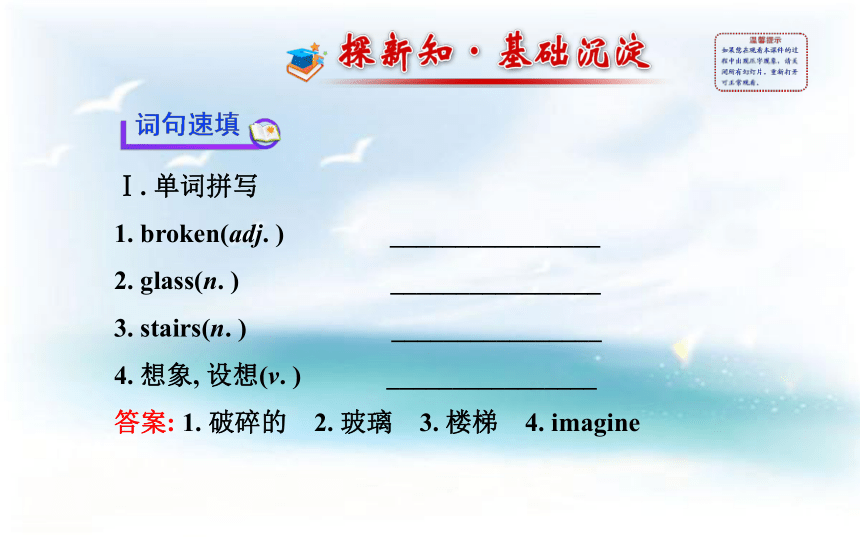
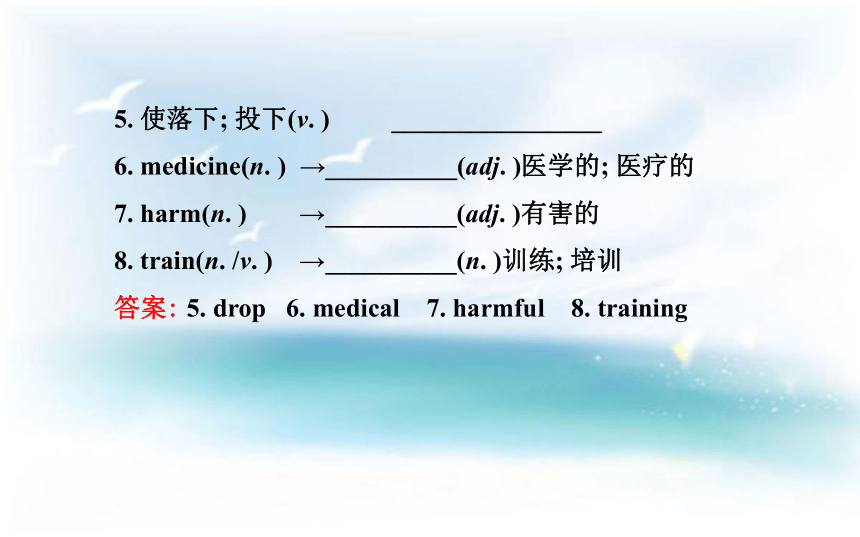
文档简介
课件105张PPT。Module 12
Help
精讲导学 巧练激活【导语】当我们遇到危险时, 不要惧怕危险, 要勇于接受危险的挑战, 那么危险就不那么可怕了。Grasp it Tightly
A monkey was playing in the fields when he
was stung by a nettle(荨麻). He ran home to tell
his mother what had happened. “I only touched
it lightly, ”he said, “and the nasty thing stung
me. ”“It stung you because you only touched it lightly. ”his mother told him, “Next time you touch a nettle, grasp(抓, 握)it as tightly as you can. Then it won’t sting you at all. ”【词海拾贝】
touch 触摸; 碰
lightly 轻轻地
nasty 令人讨厌的; 恶劣的
sting 感到刺痛; 刺, 叮
in the fields 在田地里
as. . . as you can 尽可能……
not. . . at all 根本不【我的感悟】
Face any danger bravely. 要勇于面对危险。Module 12 Help
Unit 1?Ⅰ. 单词拼写
1. broken(adj. ) ________________?
2. glass(n. ) ________________?
3. stairs(n. ) ________________?
4. 想象, 设想(v. ) ________________?
答案: 1. 破碎的 2. 玻璃 3. 楼梯 4. imagine 5. 使落下; 投下(v. ) ________________?
6. medicine(n. ) →__________(adj. )医学的; 医疗的
7. harm(n. ) →__________(adj. )有害的
8. train(n. /v. ) →__________(n. )训练; 培训
答案: 5. drop 6. medical 7. harmful 8. trainingⅡ. 短语连线
1. first aid A. 确保; 确认
2. at the bottom of. . . B. 用……覆盖……
3. make a sound C. 急救
4. lift up D. 发出声音
5. cover. . . with. . . E. 在……的底部
6. make sure F. 抬起; 提起
答案: 1~6. CEDFBAⅢ. 句型填词
1. 让我们设想一次事故。
________ ________an accident.
2. 他很疼。
He is________ ________.
3. 首先, 查明他怎么了。
First of all, _______ _______ ________ wrong __________ him.
答案: 1. Let’s imagine 2. in pain 3. find out what’s; with4. 但是他可能很难听到你说话或者和你说话。
But he could ________ ________ _______you or speaking to you.
5. 这个建议非常好, 贝蒂, 你都可以当医生了!
That’s________good advice________you could be a doctor, Betty!
答案:4. have trouble hearing 5. such; that1. That’s such good advice that you could
be a doctor, Betty!
2. Little Tommy is so clever that we all like him.
?
?
答案: such+ adj. +不可数名词/可数名词复数+that从句
such+a/an+ adj. +单数可数名词+that从句
so+ adj. +that从句1. imagine v. 想象, 设想
【语境领悟】
*Let’s imagine an accident. 让我们设想一次事故。
*Mrs. Wu can’t imagine living in a place like that.
吴夫人无法想象住在一个那样的地方。【自主归纳】
imagine及物动词, 意为“想象; 设想”, 其后常接名词、代词、动名词或从句作宾语, 即:
(1)imagine +n. “想象, 设想某事”
(2)imagine + doing sth. “想象做某事”
(3)imagine + that从句“想象……”
(4)imagine sb. /sth. (to be). . . “想象某人/某事(是)……”【学以致用】
Can you imagine ______ Mount Qomolangma?
A. climb B. to climb
C. climbing D. climbs2. trouble n. 问题; 烦恼; 困难
【语境领悟】
*But he could have trouble hearing you or speaking to you.
但是他可能很难听到你说话或和你对话。
*I’m sorry to trouble you. 很抱歉麻烦你。【自主归纳】
(1)trouble作名词, 意为“麻烦”, 常用于固定结构: have trouble(in)doing sth. 做某事有困难, 同义短语为have difficulty(in)doing sth. 。
(2)trouble作动词, 意为“麻烦; 使烦恼”, 后接名词或代词作宾语。【归纳拓展】 和trouble相关的不同搭配
be in trouble 处于困境中
make trouble 制造麻烦
get into trouble 陷入麻烦
have trouble with sth. 某事有麻烦【学以致用】
(2013·黄石中考)He has some t__________ understanding what his teacher says because of his poor English.
答案: trouble3. cover v. 盖; 盖上
【语境领悟】
*Cover him with a coat. 把外套盖在他身上。
*Water covers most parts of the earth.
水覆盖了地球上大部分地区。
*The cover of the book is very beautiful.
这本书的封面很漂亮。【自主归纳】
(1)cover作动词, 意为“覆盖; 遮盖”, 后接名词或代词作宾语, 常用搭配: cover. . . with. . . “把……覆盖在……上”; 其被动形式为: be covered with“被……覆盖”。
(2)cover作名词, 意为“封面; 盖子”。例如: I have a storybook. Its cover is green. 我有一本故事书。它的封面是绿色的。【学以致用】
(2013·漳州中考)Please__________(覆盖)the table with this piece of cloth.
答案: cover4. make sure 确保; 确认
【语境领悟】
*Make sure he’s warm. 确保他是温暖的。
*Daming has made sure of the time of the train.
大明已经弄清楚火车的时间了。【自主归纳】
(1)make sure意为“确保; 保证”, 后可接that引导的宾语从句。
(2)make sure后面还可接of短语, 构成make sure of sth. 对……有把握/确信某事/确定, 弄清楚某事。【归纳拓展】 be sure的用法
be sure意为“确信”, 表示有把握, 有信心, 可以和动词不定式、of短语或that从句连用。例如: Are you sure you will win?你有把握获胜吗?【学以致用】
(2013·青岛中考)There aren’t many tickets left for the concert, you’d better______that you get one today.
A. make sure of B. make a decision
C. make sure D. make plans5. That’s such good advice that you could be a doctor, Betty!
这个建议非常好, 贝蒂, 你都可以当医生了!
【句型剖析】
such. . . that. . . “如此……以至于……”, 引导结果状语从句, such后接名词, 名词前可以有形容词修饰。如果后接形容词或副词, 则要用so. . . that. . . 句型。【妙辨异同】so与such的区别
(1)such用来修饰名词, so用来修饰形容词或副词; 两词都可以与that从句连用。
(2)such与so常用结构有:
①such+ a/an+adj. +单数可数名词
adj. +不可数名词
adj. +可数名词复数②so+ adj. /adv.
adj. +a/an+单数可数名词
many/few+可数名词复数
much/little(少)+不可数名词【一言辨异】
I’m amazed that so many students are playing soccer on the playground on such a hot day.
这样热的天还有这么多学生在操场上踢足球, 我感到很惊讶。【学以致用】
(2013·泰州中考) I’m a Singer is ______ an interesting TV show ______ many people like watching it.
A. so; that B. such; that
C. so; as D. such; as【备选要点】
First of all, find out what’s wrong with him.
首先, 查明他怎么了。
【句型剖析】
(1)What’s wrong with sb. /sth. ?……怎么了?通常是用于询问某人/事物的问题, 出了什么毛病。
(2)同义句型有: What’s the matter/trouble/problem with sb. ?
What’s your trouble? What’s up with sb. ?What happened to sb. ?【学以致用】
(2013·南充中考)—Mum, I’m not feeling well.
—Oh, dear! ____
A. What’s wrong? B. Not at all. C. All right. Ⅰ. 单项选择
1. You could ask the teacher for help when you have ________ learning English.
A. training B. advice C. medicine D. trouble
2. Uncle Huang told ______ an interesting story that we all laughed.
A. so B. such
C. too D. neither3. I can’t imagine ______ friends with volleyball.
A. making B. make
C. makes D. made
4. The girl hurt her leg and couldn’t move. Maybe she was______.
A. in a pain B. on pain
C. in pain D. on painsⅡ. 完成句子
1. 在大海的底部生活着各种各样的鱼。
There are all kinds of fishes_______ _______ _______ _______
the sea.
2. 你看上去很伤心。出什么事啦?
You look very sad. _______ ________ ________you?
答案: 1. at the bottom of 2. What’s wrong with3. 戴维很强壮。他能够容易地抬起那个重的箱子。
David is very strong. He can________ ________that heavy box easily.
4. 你能确定火车是否准点吗?
Can you________ ________whether the train is on time?
答案:3. lift up 4. make sureModule 12 Help
Unit 2?Ⅰ. 单词拼写
1. earthquake(n. ) ________________?
2. power(n. ) ________________?
3. 警告; 告诫(v. ) ________________?
4. 勇敢的; 无畏的(adj. ) ________________?
5. outside →__________(反义词)
6. help →__________(adj. )有用的; 提供帮助的
答案: 1. 地震 2. 电; 电力 3. warn 4. brave 5. inside
6. helpfulⅡ. 短语互译
1. keep clear of. . . ______________?
2. stop doing sth. ______________?
3. 保持冷静 ______________?
4. 注意…… ______________?
5. 简言之 ______________?
答案: 1. 不和……接触 2. 停止做某事
3. keep calm 4. be careful of 5. in shortⅢ. 句型填词
1. 地震总是发生得很突然, 所以很难给予人们预警。
Earthquakes always happen suddenly, so it is difficult ________ ________ people ________them.
2. 不要往高大的建筑物外跳。
______ _______ _______ _______ _______high buildings.
答案: 1. to warn; about 2. Do not jump out of3. 远离窗子和重家具。
______ ________ ________windows and heavy furniture.
4. 总之, 按照在学校所学到的(地震)知识去做。
In short, follow _______ ________ _______in school.
答案: 3. Stay away from 4. what you learnt1. Do people have little or no idea about
what to do during an earthquake?
?
2. What should people do when they are on a beach during an earthquake?
??
答案: 1. Yes, they do.
2. They should run away from the sea and move quickly to higher ground. 1. warn v. 警告; 告诫
【语境领悟】
*Earthquakes always happen suddenly, so it is difficult to warn people about them.
地震总是发生得很突然, 所以很难给予人们预警。
*The policeman warned the driver of the danger of driving so fast.
警察提醒这位司机开得如此快的危险。【自主归纳】
warn作动词, 意为“警告; 告诫; 提醒”, 常用短语warn sb. about sth. 意为“警告某人某事”, 相当于warn sb. of sth. 。【归纳拓展】 warn的不同搭配
(1)warn sb. to do sth. 意为“告诫某人做某事”。
(2)warn sb. against doing sth. =warn sb. not to do sth. 意为“警告/提醒某人不要做某事”。
(3)warn sb. that. . . 意为“警告/提醒某人……”。【学以致用】
她父母经常提醒她注意她的功课。
Her parents often______her______her schoolwork.
答案: warn; about/of2. keep v. 保持; 留在
【语境领悟】
*Keep calm. 保持镇静。
*Close the door to keep the room warm.
关上门以保持室内温暖。
*I’m sorry to keep you waiting so long.
对不起让你久等了。【自主归纳】
keep意为“保持; 留在”, 其后可跟形容词、过去分词、现在分词等作宾语补足语。常用结构有:
(1)keep + sb. /sth. +adj. 意为“使某人/某物处于某种状态”。
(2)keep sb. /sth. doing sth. 意为“使某人/某物一直做某事”。【温馨提示】
keep还可以表示“借”。与时间段连用时, 只能用keep, 而不能用非延续性动词borrow。【学以致用】
①(2013·苏州中考)她让我一连说了45分钟。
_______________________________________________
②(2013·遂宁中考)对我们而言保持健康很重要。
It’s very important for us to______ ______.
答案: ①She kept me talking for forty-five minutes.
②keep healthyⅠ. 从方框中选择合适的单词或短语并用其适当形式填空
in short, keep clear of, earthquake, brave, inside
1. Thousands of people lost their houses in the terrible __________.
2. Let’s put our clothes __________ of the cupboard(衣橱).
3. ________, we should try our best to help the people in trouble.
答案:1. earthquake 2. inside 3. In short 4. The boy was so ________ that he saved two babies from the fire.
5. We should protect our environment to __________ the pollution.
答案: 4. brave 5. keep clear ofⅡ. 完成句子
1. 当公交车停下来之前, 别往外跳。
Do not_______ ________ ________the bus until it stops.
2. 留心那只狗, 它有时候会咬人。
_______ _________ _________that dog; it sometimes bites people.
答案: 1. jump out of 2. Be careful of3. 老师警告亨利上课时不要往窗外看。
The teacher________Henry_______ ________ _______out of the window in class.
4. 他叫他的孩子们远离危险的电器。
He told his children to _______ ________ ________dangerous electrical things.
答案:3. warned; not to look 4. stay away fromModule 12 Help
Unit 3?on one’s/the way在路上, 在途中
【语境领悟】
*. . . a huge ocean wave, was on its way across the sea.
……一股巨大的海浪正从海面上涌来。
*Tony is on his way to the station.
托尼正在去车站的路上。【自主归纳】
on one’s/the way意为“在路上, 在途中”。后接宾语时加to, 即on one’s/the way to+地点, 后接地点副词时, 省略to。例如: on one’s/the way home“在回家的路上”。【归纳拓展】 way的不同搭配【学以致用】
汤姆在去姑姑家的路上迷路了。
Tom was lost________ ________ ________ _______his aunt’s home.
答案: on his/the way to【备选要点】
A ten-year-old girl saved about one hundred other tourists in 2004 by warning them. . .
2004年, 一个10岁的女孩通过警告他们挽救了大约100名游客的性命……
【句型剖析】
“by+动词-ing”结构在句子中作方式状语, 常用来表示“以、靠、借助、通过、用(某种方法或手段)”来达到某种预期的目的。例如: The children realize the life is more wonderful by helping others. 通过帮助别人, 孩子们认识到生活更美好。【学以致用】
(2013·重庆中考)You can improve your English ______ practicing more.
A. by B. with C. of D. inⅠ. 从方框中选择合适的短语并用其适当形式填空
on one’s/the way, because of, in trouble, be proud of,
learn about
1. —Did you __________ the tsunami, Lucy?
—Of course, it’s very terrible.
2. Mother often tells us we should help the people________.
3. We didn’t go there ________ the bad weather.
答案: 1. learn about 2. in trouble 3. because of4. Mo Yan got the 2012 Nobel Prize in Literature. We __________ him.
5. I met my old friend __________ to the supermarket yesterday.
答案: 4. are proud of 5. on my/the wayⅡ. 单项选择
1. People show their love for their mothers ______ giving some presents.
A. on B. in C. to D. by
2. (2013·绥化中考)She is a ______ girl with two big eyes.
A. six-years-old B. six-year-old
C. six years old
3. She entered the room without ______ at the door.
A. to knock B. knocked
C. knocking D. knock4. ______lift him up and sit him on a chair.
A. Don’t B. No C. Not D. Be
5. ______there is no problem with power lines.
A. Being sure B. Make sure
C. Is sure D. Making sure一、祈使句
【语境领悟】
仔细观察例句并体会祈使句的用法。
1. Be brave and be helpful.
2. Make him comfortable.
3. Let’s imagine an accident.
4. Do not jump out of high buildings. 【知识构建】
(一)定义
祈使句可以表达说话人的意愿、请求、叮嘱、命令或建议, 它的主语you(听话人)通常省略, 谓语动词用动词原形。句末用感叹号或句号, 读时用降调。(二)构成
1. 肯定形式。
(1)Do型: 实义动词(+宾语)+其他成分。
(2)Be型: Be +表语+其他成分。
(3)Let型: Let +宾语+动词原形+其他成分。2. 否定形式。
(1)Do型和Be型的否定形式都是在句首加Don’t构成。
(2)Let型的否定形式有两种: 在let前加Don’t和“Let sb. +not +动词原形+其他成分”。
(3)Never型。
Never +动词原形。表示劝告, 意为“不要……”。
(4)No型。
No+名词/动名词+其他成分! 多用于公共场合的警示语, 意为“禁止”。3. 反意疑问句形式。
(1)祈使句一般加上will you/won’t you构成反意疑问句。
(2)Let’s. . . 的反意疑问句用shall we; Let us/me. . . 的反意疑问句用will you或won’t you。(三)祈使句与简单句、复合句之间的转换
1. “Let’s +动词原形”结构表建议, 并包括说话者和对方在内, 可转化为“Shall we +动词原形?”。
2. “祈使句+and/then+简单句”, 可将祈使句转换为含if条件状语从句的复合句, 从句谓语用肯定形式。
3. “祈使句+or+简单句”, 可将祈使句转换为含if条件状语从句的复合句, 从句谓语用否定形式。【学以致用】
用所给单词的适当形式填空
1. Let’s______(say)it in English.
2. Don’t______(walk)so fast. I can’t follow you.
3. ______(take)a message for him, please.
4. ______(be)quick, or you will be late.
答案: 1. say 2. walk 3. Take 4. Be句型转换
1. Open the door. (改为反意疑问句)
Open the door, ________ ________?
2. Let me have a look. (改为反意疑问句)
Let me have a look, ________ ________?
3. Let’s fly a kite. (改为反意疑问句)
Let’s fly a kite, ________ ________?
答案: 1. will you/won’t you
2. will you/won’t you 3. shall we4. Work hard, or you will fail in the exam. (改为同义句)
________you________ work hard, you________ fail in the exam.
5. Catch the cat, please. (改为否定句)
________ ________the cat, please.
6. Close your eyes, please. (改为一般疑问句)
_______ _________ ________close your eyes?
答案: 4. If; don’t; will 5. Don’t catch
6. Will you please二、情态动词must, can, could表示推测
【语境领悟】
仔细观察例句并体会情态动词的用法。
1. That could be harmful!
2. Betty, you must know!
3. Can/Could this be true?
4. The news can’t be true. 【知识构建】
1. must:
(1)must表推测, 意为“肯定; 一定”, 可能性很大。
You must know him well. 你肯定跟他很熟。
(2)must表推测只能用于肯定句中, 表否定的判断时要用can’t, 表示“肯定不”。2. can/could:
(1)can/could表示对现在或将来的一种推测, 意为“会; 可能”, can表推测时, 往往用于否定句和疑问句中。用于疑问句中, can比could的可能性要大; 用于否定句中, 表示“不可能”。
The car can’t be his. 这辆车肯定不是他的。
(2)could则可以用于肯定句、否定句和疑问句中, 表示某事有可能发生或可能是事实。
That could be very important to him.
那对他来说可能很重要。【学以致用】
单项选择。
1. —You must be here at 5: 30 tomorrow morning.
—Sorry, I______be here so early.
A. needn’t B. mustn’t C. can’t D. shouldn’t
2. That________be harmful if you do like that.
A. could B. mustn’t
C. would D. wouldn’t
3. The book______be Li Lei’s. Because his name is on it.
A. can B. could C. may D. must 近年来, 地震频发。那么面对突如其来的地震, 我们应该如何防范, 如何逃生呢?请你用英语写一篇80~100个词的作文。
【思路点拨】
1. 体裁: 说明文。
2. 人称: 第一人称、第二人称(多用于祈使句)。
3. 时态: 一般现在时。【写作模板】【妙笔成篇】
_____________________________________________________________________________________________________________________________________________________________________________________________________________________________________________________________________________【参考范文】
How to Save Ourselves in the Earthquake
There have been many earthquakes in recent years. Then what can we do during the earthquake?
Firstly, don’t cry and calm down. Secondly, find some safe places to stay in and don’t run in such a hurry. If in the room, one should hide himself/herself under something hard, such as desks, tables or even beds and keep away from shelves and cupboards, and never take a lift to go downstairs. If you are in the open air, find an open place and never get close to cars or waterside. Thirdly, we should help each other when we meet trouble. At last, no matter how strong the earthquake is, if only we have the belief to defeat it, we must be able to overcome any difficulties. 模块复习课
Module 12Ⅰ. 词汇速记
1. 想象(v. ) ______________?
2. 警告; 告诫(v. ) ______________?
3. 保持; 留在(v. ) ______________?
4. 勇敢的; 无畏的(adj. ) ______________?
5. 楼梯(n. )(pl. ) ______________?
答案: 1. imagine 2. warn 3. keep 4. brave 5. stairs6. 问题; 烦恼; 困难(n. ) ______________?
7. 使落下; 投下(v. ) ______________?
8. 电; 电力(n. ) ______________?
9. break(v. ) →__________(adj. )破碎的
10. medicine(n. ) →__________(adj. )医学的; 医疗的
答案: 6. trouble 7. drop 8. power 9. broken 10. medical11. train(v. ) →__________(n. )训练; 培训
12. harm(v. ) →__________(adj. )有害的
13. help(v. ) →__________(adj. )有用的; 提供帮助的
答案: 11. training 12. harmful 13. helpfulⅡ. 短语互译
1. 找出; 查明 find______?
2. 离开 stay______?
3. 警告某人某事 ________sb. ________sth.
4. 在……的底部 ______the_____ _____?
5. 确保; 确认 make____?
答案: 1. out 2. away 3. warn; about 4. at; bottom of
5. sure 6. lift up ________________?
7. keep clear of. . . ________________?
8. in short ________________?
9. because of ________________?
10. be proud of ________________?
答案: 6. 抬起; 提起 7. 不和……接触 8. 总之; 简言之
9. 因为; 由于 10. 为……而骄傲Ⅲ. 句型攻关
1. 让我们一起去看电影吧。
________ ________to see the film together.
2. 刘明在学英语语法方面有困难。
Liu Ming _________ _________in _________ English grammar.
3. ——你爷爷怎么了?
——他昨天从自行车上摔下来了。
—_________ _________ _________your grandpa?
—He fell off the bike yesterday.
答案: 1. Let’s go 2. has trouble; learning
3. What’s wrong with 4. 林萍是如此可爱的一个女孩, 以至于大家都很喜欢她。
Lin Ping is______a lovely girl______everyone loves her.
5. 对不起让你久等了。
I’m sorry to______you______so long.
6. 通过帮助别人, 孩子们认识到生活更美好。
The children realized the life is more wonderful______ ______others.
答案: 4. such; that 5. keep; waiting 6. by helpingⅣ. 语法专练
用could, must, mustn’t填空。
1. It’s dangerous inside. You________keep out.
2. You________get hurt, so keep away.
3. Don’t move the boy. You________hurt him even more.
4. Don’t drive so fast. There________be an accident.
5. You________stay so close to the fire. It’s dangerous.
答案: 1. must 2. could 3. could 4. could 5. mustn’tⅤ. 真题体验
1. (2013·株洲中考)—Oh, it’s raining hard.
—Be careful! The road______be wet.
A. could B. must C. might
【解析】选B。考查情态动词的用法。could和might表示没有把握的推测, must表示有把握的推测。根据上句句意“正在下大雨”, 可推测“路肯定很湿”。故选B。2. (2013·鞍山中考)The children will climb the hill if it______tomorrow.
A. won’t rain B. didn’t rain
C. isn’t raining D. doesn’t rain
【解析】选D。考查条件状语从句。if引导条件状语从句, 主句用一般将来时, 从句用一般现在时表示将来。故选D。3. (2013·泰州中考)—It’s______of Yang Xiangming to save the boy who fell into the river.
—Yes. He is a great man of our times.
A. patient B. energetic
C. brave D. confident
【解析】选C。考查形容词辨析。patient耐心的; energetic有活力的; brave勇敢的; confident有信心的。根据句意可知选C。4. (2013·聊城中考)—Mum, I was the first to reach the top of the mountain.
—Good job, Jack! I’m______of you.
A. careful B. proud C. tired D. afraid
【解析】选B。考查形容词的用法。句意: ——妈妈, 我是第一个到达山顶的人。——干得好, 杰克! 我为你骄傲。careful“仔细的; 小心的”; proud“骄傲的”; tired“疲劳的”; afraid“害怕的”。5. (2013·凉山中考)—It’s late, Teresa. ______earlier next time and you’ll have enough time to have breakfast.
—OK. Mum. I remember.
A. Get up B. Getting up C. To get up
【解析】选A。考查祈使句。根据句意可知此处表示命令或请求某人做某事, 用动词原形。故选A。6. (2013·新疆中考)I think______(医学的)level in the city is better than that in the countryside.
答案: medical完成句子
1. 在做完作业之前, 你不准看电视。
You________watch TV before finishing your homework.
2. 你一定饿了吧。吃点面包吧。
You________ ________hungry. Eat some bread.
3. 别把这支新钢笔带到学校。你可能会把它弄丢。
Don’t take this new pen to school. You________ ________it.
答案: 1. mustn’t 2. must be 3. could lose4. 你必须离开这里。
You________move________from here.
5. 你未来有可能成为作家。
You________ ________a writer in the future.
6. 不要走这么快。我跟不上你。
________ ________so fast. I can’t follow you.
7. 让我们一起去徒步旅行吧。
_________ ________hiking together.
答案: 4. must; away 5. could be 6. Don’t walk 7. Let’s go
Help
精讲导学 巧练激活【导语】当我们遇到危险时, 不要惧怕危险, 要勇于接受危险的挑战, 那么危险就不那么可怕了。Grasp it Tightly
A monkey was playing in the fields when he
was stung by a nettle(荨麻). He ran home to tell
his mother what had happened. “I only touched
it lightly, ”he said, “and the nasty thing stung
me. ”“It stung you because you only touched it lightly. ”his mother told him, “Next time you touch a nettle, grasp(抓, 握)it as tightly as you can. Then it won’t sting you at all. ”【词海拾贝】
touch 触摸; 碰
lightly 轻轻地
nasty 令人讨厌的; 恶劣的
sting 感到刺痛; 刺, 叮
in the fields 在田地里
as. . . as you can 尽可能……
not. . . at all 根本不【我的感悟】
Face any danger bravely. 要勇于面对危险。Module 12 Help
Unit 1?Ⅰ. 单词拼写
1. broken(adj. ) ________________?
2. glass(n. ) ________________?
3. stairs(n. ) ________________?
4. 想象, 设想(v. ) ________________?
答案: 1. 破碎的 2. 玻璃 3. 楼梯 4. imagine 5. 使落下; 投下(v. ) ________________?
6. medicine(n. ) →__________(adj. )医学的; 医疗的
7. harm(n. ) →__________(adj. )有害的
8. train(n. /v. ) →__________(n. )训练; 培训
答案: 5. drop 6. medical 7. harmful 8. trainingⅡ. 短语连线
1. first aid A. 确保; 确认
2. at the bottom of. . . B. 用……覆盖……
3. make a sound C. 急救
4. lift up D. 发出声音
5. cover. . . with. . . E. 在……的底部
6. make sure F. 抬起; 提起
答案: 1~6. CEDFBAⅢ. 句型填词
1. 让我们设想一次事故。
________ ________an accident.
2. 他很疼。
He is________ ________.
3. 首先, 查明他怎么了。
First of all, _______ _______ ________ wrong __________ him.
答案: 1. Let’s imagine 2. in pain 3. find out what’s; with4. 但是他可能很难听到你说话或者和你说话。
But he could ________ ________ _______you or speaking to you.
5. 这个建议非常好, 贝蒂, 你都可以当医生了!
That’s________good advice________you could be a doctor, Betty!
答案:4. have trouble hearing 5. such; that1. That’s such good advice that you could
be a doctor, Betty!
2. Little Tommy is so clever that we all like him.
?
?
答案: such+ adj. +不可数名词/可数名词复数+that从句
such+a/an+ adj. +单数可数名词+that从句
so+ adj. +that从句1. imagine v. 想象, 设想
【语境领悟】
*Let’s imagine an accident. 让我们设想一次事故。
*Mrs. Wu can’t imagine living in a place like that.
吴夫人无法想象住在一个那样的地方。【自主归纳】
imagine及物动词, 意为“想象; 设想”, 其后常接名词、代词、动名词或从句作宾语, 即:
(1)imagine +n. “想象, 设想某事”
(2)imagine + doing sth. “想象做某事”
(3)imagine + that从句“想象……”
(4)imagine sb. /sth. (to be). . . “想象某人/某事(是)……”【学以致用】
Can you imagine ______ Mount Qomolangma?
A. climb B. to climb
C. climbing D. climbs2. trouble n. 问题; 烦恼; 困难
【语境领悟】
*But he could have trouble hearing you or speaking to you.
但是他可能很难听到你说话或和你对话。
*I’m sorry to trouble you. 很抱歉麻烦你。【自主归纳】
(1)trouble作名词, 意为“麻烦”, 常用于固定结构: have trouble(in)doing sth. 做某事有困难, 同义短语为have difficulty(in)doing sth. 。
(2)trouble作动词, 意为“麻烦; 使烦恼”, 后接名词或代词作宾语。【归纳拓展】 和trouble相关的不同搭配
be in trouble 处于困境中
make trouble 制造麻烦
get into trouble 陷入麻烦
have trouble with sth. 某事有麻烦【学以致用】
(2013·黄石中考)He has some t__________ understanding what his teacher says because of his poor English.
答案: trouble3. cover v. 盖; 盖上
【语境领悟】
*Cover him with a coat. 把外套盖在他身上。
*Water covers most parts of the earth.
水覆盖了地球上大部分地区。
*The cover of the book is very beautiful.
这本书的封面很漂亮。【自主归纳】
(1)cover作动词, 意为“覆盖; 遮盖”, 后接名词或代词作宾语, 常用搭配: cover. . . with. . . “把……覆盖在……上”; 其被动形式为: be covered with“被……覆盖”。
(2)cover作名词, 意为“封面; 盖子”。例如: I have a storybook. Its cover is green. 我有一本故事书。它的封面是绿色的。【学以致用】
(2013·漳州中考)Please__________(覆盖)the table with this piece of cloth.
答案: cover4. make sure 确保; 确认
【语境领悟】
*Make sure he’s warm. 确保他是温暖的。
*Daming has made sure of the time of the train.
大明已经弄清楚火车的时间了。【自主归纳】
(1)make sure意为“确保; 保证”, 后可接that引导的宾语从句。
(2)make sure后面还可接of短语, 构成make sure of sth. 对……有把握/确信某事/确定, 弄清楚某事。【归纳拓展】 be sure的用法
be sure意为“确信”, 表示有把握, 有信心, 可以和动词不定式、of短语或that从句连用。例如: Are you sure you will win?你有把握获胜吗?【学以致用】
(2013·青岛中考)There aren’t many tickets left for the concert, you’d better______that you get one today.
A. make sure of B. make a decision
C. make sure D. make plans5. That’s such good advice that you could be a doctor, Betty!
这个建议非常好, 贝蒂, 你都可以当医生了!
【句型剖析】
such. . . that. . . “如此……以至于……”, 引导结果状语从句, such后接名词, 名词前可以有形容词修饰。如果后接形容词或副词, 则要用so. . . that. . . 句型。【妙辨异同】so与such的区别
(1)such用来修饰名词, so用来修饰形容词或副词; 两词都可以与that从句连用。
(2)such与so常用结构有:
①such+ a/an+adj. +单数可数名词
adj. +不可数名词
adj. +可数名词复数②so+ adj. /adv.
adj. +a/an+单数可数名词
many/few+可数名词复数
much/little(少)+不可数名词【一言辨异】
I’m amazed that so many students are playing soccer on the playground on such a hot day.
这样热的天还有这么多学生在操场上踢足球, 我感到很惊讶。【学以致用】
(2013·泰州中考) I’m a Singer is ______ an interesting TV show ______ many people like watching it.
A. so; that B. such; that
C. so; as D. such; as【备选要点】
First of all, find out what’s wrong with him.
首先, 查明他怎么了。
【句型剖析】
(1)What’s wrong with sb. /sth. ?……怎么了?通常是用于询问某人/事物的问题, 出了什么毛病。
(2)同义句型有: What’s the matter/trouble/problem with sb. ?
What’s your trouble? What’s up with sb. ?What happened to sb. ?【学以致用】
(2013·南充中考)—Mum, I’m not feeling well.
—Oh, dear! ____
A. What’s wrong? B. Not at all. C. All right. Ⅰ. 单项选择
1. You could ask the teacher for help when you have ________ learning English.
A. training B. advice C. medicine D. trouble
2. Uncle Huang told ______ an interesting story that we all laughed.
A. so B. such
C. too D. neither3. I can’t imagine ______ friends with volleyball.
A. making B. make
C. makes D. made
4. The girl hurt her leg and couldn’t move. Maybe she was______.
A. in a pain B. on pain
C. in pain D. on painsⅡ. 完成句子
1. 在大海的底部生活着各种各样的鱼。
There are all kinds of fishes_______ _______ _______ _______
the sea.
2. 你看上去很伤心。出什么事啦?
You look very sad. _______ ________ ________you?
答案: 1. at the bottom of 2. What’s wrong with3. 戴维很强壮。他能够容易地抬起那个重的箱子。
David is very strong. He can________ ________that heavy box easily.
4. 你能确定火车是否准点吗?
Can you________ ________whether the train is on time?
答案:3. lift up 4. make sureModule 12 Help
Unit 2?Ⅰ. 单词拼写
1. earthquake(n. ) ________________?
2. power(n. ) ________________?
3. 警告; 告诫(v. ) ________________?
4. 勇敢的; 无畏的(adj. ) ________________?
5. outside →__________(反义词)
6. help →__________(adj. )有用的; 提供帮助的
答案: 1. 地震 2. 电; 电力 3. warn 4. brave 5. inside
6. helpfulⅡ. 短语互译
1. keep clear of. . . ______________?
2. stop doing sth. ______________?
3. 保持冷静 ______________?
4. 注意…… ______________?
5. 简言之 ______________?
答案: 1. 不和……接触 2. 停止做某事
3. keep calm 4. be careful of 5. in shortⅢ. 句型填词
1. 地震总是发生得很突然, 所以很难给予人们预警。
Earthquakes always happen suddenly, so it is difficult ________ ________ people ________them.
2. 不要往高大的建筑物外跳。
______ _______ _______ _______ _______high buildings.
答案: 1. to warn; about 2. Do not jump out of3. 远离窗子和重家具。
______ ________ ________windows and heavy furniture.
4. 总之, 按照在学校所学到的(地震)知识去做。
In short, follow _______ ________ _______in school.
答案: 3. Stay away from 4. what you learnt1. Do people have little or no idea about
what to do during an earthquake?
?
2. What should people do when they are on a beach during an earthquake?
??
答案: 1. Yes, they do.
2. They should run away from the sea and move quickly to higher ground. 1. warn v. 警告; 告诫
【语境领悟】
*Earthquakes always happen suddenly, so it is difficult to warn people about them.
地震总是发生得很突然, 所以很难给予人们预警。
*The policeman warned the driver of the danger of driving so fast.
警察提醒这位司机开得如此快的危险。【自主归纳】
warn作动词, 意为“警告; 告诫; 提醒”, 常用短语warn sb. about sth. 意为“警告某人某事”, 相当于warn sb. of sth. 。【归纳拓展】 warn的不同搭配
(1)warn sb. to do sth. 意为“告诫某人做某事”。
(2)warn sb. against doing sth. =warn sb. not to do sth. 意为“警告/提醒某人不要做某事”。
(3)warn sb. that. . . 意为“警告/提醒某人……”。【学以致用】
她父母经常提醒她注意她的功课。
Her parents often______her______her schoolwork.
答案: warn; about/of2. keep v. 保持; 留在
【语境领悟】
*Keep calm. 保持镇静。
*Close the door to keep the room warm.
关上门以保持室内温暖。
*I’m sorry to keep you waiting so long.
对不起让你久等了。【自主归纳】
keep意为“保持; 留在”, 其后可跟形容词、过去分词、现在分词等作宾语补足语。常用结构有:
(1)keep + sb. /sth. +adj. 意为“使某人/某物处于某种状态”。
(2)keep sb. /sth. doing sth. 意为“使某人/某物一直做某事”。【温馨提示】
keep还可以表示“借”。与时间段连用时, 只能用keep, 而不能用非延续性动词borrow。【学以致用】
①(2013·苏州中考)她让我一连说了45分钟。
_______________________________________________
②(2013·遂宁中考)对我们而言保持健康很重要。
It’s very important for us to______ ______.
答案: ①She kept me talking for forty-five minutes.
②keep healthyⅠ. 从方框中选择合适的单词或短语并用其适当形式填空
in short, keep clear of, earthquake, brave, inside
1. Thousands of people lost their houses in the terrible __________.
2. Let’s put our clothes __________ of the cupboard(衣橱).
3. ________, we should try our best to help the people in trouble.
答案:1. earthquake 2. inside 3. In short 4. The boy was so ________ that he saved two babies from the fire.
5. We should protect our environment to __________ the pollution.
答案: 4. brave 5. keep clear ofⅡ. 完成句子
1. 当公交车停下来之前, 别往外跳。
Do not_______ ________ ________the bus until it stops.
2. 留心那只狗, 它有时候会咬人。
_______ _________ _________that dog; it sometimes bites people.
答案: 1. jump out of 2. Be careful of3. 老师警告亨利上课时不要往窗外看。
The teacher________Henry_______ ________ _______out of the window in class.
4. 他叫他的孩子们远离危险的电器。
He told his children to _______ ________ ________dangerous electrical things.
答案:3. warned; not to look 4. stay away fromModule 12 Help
Unit 3?on one’s/the way在路上, 在途中
【语境领悟】
*. . . a huge ocean wave, was on its way across the sea.
……一股巨大的海浪正从海面上涌来。
*Tony is on his way to the station.
托尼正在去车站的路上。【自主归纳】
on one’s/the way意为“在路上, 在途中”。后接宾语时加to, 即on one’s/the way to+地点, 后接地点副词时, 省略to。例如: on one’s/the way home“在回家的路上”。【归纳拓展】 way的不同搭配【学以致用】
汤姆在去姑姑家的路上迷路了。
Tom was lost________ ________ ________ _______his aunt’s home.
答案: on his/the way to【备选要点】
A ten-year-old girl saved about one hundred other tourists in 2004 by warning them. . .
2004年, 一个10岁的女孩通过警告他们挽救了大约100名游客的性命……
【句型剖析】
“by+动词-ing”结构在句子中作方式状语, 常用来表示“以、靠、借助、通过、用(某种方法或手段)”来达到某种预期的目的。例如: The children realize the life is more wonderful by helping others. 通过帮助别人, 孩子们认识到生活更美好。【学以致用】
(2013·重庆中考)You can improve your English ______ practicing more.
A. by B. with C. of D. inⅠ. 从方框中选择合适的短语并用其适当形式填空
on one’s/the way, because of, in trouble, be proud of,
learn about
1. —Did you __________ the tsunami, Lucy?
—Of course, it’s very terrible.
2. Mother often tells us we should help the people________.
3. We didn’t go there ________ the bad weather.
答案: 1. learn about 2. in trouble 3. because of4. Mo Yan got the 2012 Nobel Prize in Literature. We __________ him.
5. I met my old friend __________ to the supermarket yesterday.
答案: 4. are proud of 5. on my/the wayⅡ. 单项选择
1. People show their love for their mothers ______ giving some presents.
A. on B. in C. to D. by
2. (2013·绥化中考)She is a ______ girl with two big eyes.
A. six-years-old B. six-year-old
C. six years old
3. She entered the room without ______ at the door.
A. to knock B. knocked
C. knocking D. knock4. ______lift him up and sit him on a chair.
A. Don’t B. No C. Not D. Be
5. ______there is no problem with power lines.
A. Being sure B. Make sure
C. Is sure D. Making sure一、祈使句
【语境领悟】
仔细观察例句并体会祈使句的用法。
1. Be brave and be helpful.
2. Make him comfortable.
3. Let’s imagine an accident.
4. Do not jump out of high buildings. 【知识构建】
(一)定义
祈使句可以表达说话人的意愿、请求、叮嘱、命令或建议, 它的主语you(听话人)通常省略, 谓语动词用动词原形。句末用感叹号或句号, 读时用降调。(二)构成
1. 肯定形式。
(1)Do型: 实义动词(+宾语)+其他成分。
(2)Be型: Be +表语+其他成分。
(3)Let型: Let +宾语+动词原形+其他成分。2. 否定形式。
(1)Do型和Be型的否定形式都是在句首加Don’t构成。
(2)Let型的否定形式有两种: 在let前加Don’t和“Let sb. +not +动词原形+其他成分”。
(3)Never型。
Never +动词原形。表示劝告, 意为“不要……”。
(4)No型。
No+名词/动名词+其他成分! 多用于公共场合的警示语, 意为“禁止”。3. 反意疑问句形式。
(1)祈使句一般加上will you/won’t you构成反意疑问句。
(2)Let’s. . . 的反意疑问句用shall we; Let us/me. . . 的反意疑问句用will you或won’t you。(三)祈使句与简单句、复合句之间的转换
1. “Let’s +动词原形”结构表建议, 并包括说话者和对方在内, 可转化为“Shall we +动词原形?”。
2. “祈使句+and/then+简单句”, 可将祈使句转换为含if条件状语从句的复合句, 从句谓语用肯定形式。
3. “祈使句+or+简单句”, 可将祈使句转换为含if条件状语从句的复合句, 从句谓语用否定形式。【学以致用】
用所给单词的适当形式填空
1. Let’s______(say)it in English.
2. Don’t______(walk)so fast. I can’t follow you.
3. ______(take)a message for him, please.
4. ______(be)quick, or you will be late.
答案: 1. say 2. walk 3. Take 4. Be句型转换
1. Open the door. (改为反意疑问句)
Open the door, ________ ________?
2. Let me have a look. (改为反意疑问句)
Let me have a look, ________ ________?
3. Let’s fly a kite. (改为反意疑问句)
Let’s fly a kite, ________ ________?
答案: 1. will you/won’t you
2. will you/won’t you 3. shall we4. Work hard, or you will fail in the exam. (改为同义句)
________you________ work hard, you________ fail in the exam.
5. Catch the cat, please. (改为否定句)
________ ________the cat, please.
6. Close your eyes, please. (改为一般疑问句)
_______ _________ ________close your eyes?
答案: 4. If; don’t; will 5. Don’t catch
6. Will you please二、情态动词must, can, could表示推测
【语境领悟】
仔细观察例句并体会情态动词的用法。
1. That could be harmful!
2. Betty, you must know!
3. Can/Could this be true?
4. The news can’t be true. 【知识构建】
1. must:
(1)must表推测, 意为“肯定; 一定”, 可能性很大。
You must know him well. 你肯定跟他很熟。
(2)must表推测只能用于肯定句中, 表否定的判断时要用can’t, 表示“肯定不”。2. can/could:
(1)can/could表示对现在或将来的一种推测, 意为“会; 可能”, can表推测时, 往往用于否定句和疑问句中。用于疑问句中, can比could的可能性要大; 用于否定句中, 表示“不可能”。
The car can’t be his. 这辆车肯定不是他的。
(2)could则可以用于肯定句、否定句和疑问句中, 表示某事有可能发生或可能是事实。
That could be very important to him.
那对他来说可能很重要。【学以致用】
单项选择。
1. —You must be here at 5: 30 tomorrow morning.
—Sorry, I______be here so early.
A. needn’t B. mustn’t C. can’t D. shouldn’t
2. That________be harmful if you do like that.
A. could B. mustn’t
C. would D. wouldn’t
3. The book______be Li Lei’s. Because his name is on it.
A. can B. could C. may D. must 近年来, 地震频发。那么面对突如其来的地震, 我们应该如何防范, 如何逃生呢?请你用英语写一篇80~100个词的作文。
【思路点拨】
1. 体裁: 说明文。
2. 人称: 第一人称、第二人称(多用于祈使句)。
3. 时态: 一般现在时。【写作模板】【妙笔成篇】
_____________________________________________________________________________________________________________________________________________________________________________________________________________________________________________________________________________【参考范文】
How to Save Ourselves in the Earthquake
There have been many earthquakes in recent years. Then what can we do during the earthquake?
Firstly, don’t cry and calm down. Secondly, find some safe places to stay in and don’t run in such a hurry. If in the room, one should hide himself/herself under something hard, such as desks, tables or even beds and keep away from shelves and cupboards, and never take a lift to go downstairs. If you are in the open air, find an open place and never get close to cars or waterside. Thirdly, we should help each other when we meet trouble. At last, no matter how strong the earthquake is, if only we have the belief to defeat it, we must be able to overcome any difficulties. 模块复习课
Module 12Ⅰ. 词汇速记
1. 想象(v. ) ______________?
2. 警告; 告诫(v. ) ______________?
3. 保持; 留在(v. ) ______________?
4. 勇敢的; 无畏的(adj. ) ______________?
5. 楼梯(n. )(pl. ) ______________?
答案: 1. imagine 2. warn 3. keep 4. brave 5. stairs6. 问题; 烦恼; 困难(n. ) ______________?
7. 使落下; 投下(v. ) ______________?
8. 电; 电力(n. ) ______________?
9. break(v. ) →__________(adj. )破碎的
10. medicine(n. ) →__________(adj. )医学的; 医疗的
答案: 6. trouble 7. drop 8. power 9. broken 10. medical11. train(v. ) →__________(n. )训练; 培训
12. harm(v. ) →__________(adj. )有害的
13. help(v. ) →__________(adj. )有用的; 提供帮助的
答案: 11. training 12. harmful 13. helpfulⅡ. 短语互译
1. 找出; 查明 find______?
2. 离开 stay______?
3. 警告某人某事 ________sb. ________sth.
4. 在……的底部 ______the_____ _____?
5. 确保; 确认 make____?
答案: 1. out 2. away 3. warn; about 4. at; bottom of
5. sure 6. lift up ________________?
7. keep clear of. . . ________________?
8. in short ________________?
9. because of ________________?
10. be proud of ________________?
答案: 6. 抬起; 提起 7. 不和……接触 8. 总之; 简言之
9. 因为; 由于 10. 为……而骄傲Ⅲ. 句型攻关
1. 让我们一起去看电影吧。
________ ________to see the film together.
2. 刘明在学英语语法方面有困难。
Liu Ming _________ _________in _________ English grammar.
3. ——你爷爷怎么了?
——他昨天从自行车上摔下来了。
—_________ _________ _________your grandpa?
—He fell off the bike yesterday.
答案: 1. Let’s go 2. has trouble; learning
3. What’s wrong with 4. 林萍是如此可爱的一个女孩, 以至于大家都很喜欢她。
Lin Ping is______a lovely girl______everyone loves her.
5. 对不起让你久等了。
I’m sorry to______you______so long.
6. 通过帮助别人, 孩子们认识到生活更美好。
The children realized the life is more wonderful______ ______others.
答案: 4. such; that 5. keep; waiting 6. by helpingⅣ. 语法专练
用could, must, mustn’t填空。
1. It’s dangerous inside. You________keep out.
2. You________get hurt, so keep away.
3. Don’t move the boy. You________hurt him even more.
4. Don’t drive so fast. There________be an accident.
5. You________stay so close to the fire. It’s dangerous.
答案: 1. must 2. could 3. could 4. could 5. mustn’tⅤ. 真题体验
1. (2013·株洲中考)—Oh, it’s raining hard.
—Be careful! The road______be wet.
A. could B. must C. might
【解析】选B。考查情态动词的用法。could和might表示没有把握的推测, must表示有把握的推测。根据上句句意“正在下大雨”, 可推测“路肯定很湿”。故选B。2. (2013·鞍山中考)The children will climb the hill if it______tomorrow.
A. won’t rain B. didn’t rain
C. isn’t raining D. doesn’t rain
【解析】选D。考查条件状语从句。if引导条件状语从句, 主句用一般将来时, 从句用一般现在时表示将来。故选D。3. (2013·泰州中考)—It’s______of Yang Xiangming to save the boy who fell into the river.
—Yes. He is a great man of our times.
A. patient B. energetic
C. brave D. confident
【解析】选C。考查形容词辨析。patient耐心的; energetic有活力的; brave勇敢的; confident有信心的。根据句意可知选C。4. (2013·聊城中考)—Mum, I was the first to reach the top of the mountain.
—Good job, Jack! I’m______of you.
A. careful B. proud C. tired D. afraid
【解析】选B。考查形容词的用法。句意: ——妈妈, 我是第一个到达山顶的人。——干得好, 杰克! 我为你骄傲。careful“仔细的; 小心的”; proud“骄傲的”; tired“疲劳的”; afraid“害怕的”。5. (2013·凉山中考)—It’s late, Teresa. ______earlier next time and you’ll have enough time to have breakfast.
—OK. Mum. I remember.
A. Get up B. Getting up C. To get up
【解析】选A。考查祈使句。根据句意可知此处表示命令或请求某人做某事, 用动词原形。故选A。6. (2013·新疆中考)I think______(医学的)level in the city is better than that in the countryside.
答案: medical完成句子
1. 在做完作业之前, 你不准看电视。
You________watch TV before finishing your homework.
2. 你一定饿了吧。吃点面包吧。
You________ ________hungry. Eat some bread.
3. 别把这支新钢笔带到学校。你可能会把它弄丢。
Don’t take this new pen to school. You________ ________it.
答案: 1. mustn’t 2. must be 3. could lose4. 你必须离开这里。
You________move________from here.
5. 你未来有可能成为作家。
You________ ________a writer in the future.
6. 不要走这么快。我跟不上你。
________ ________so fast. I can’t follow you.
7. 让我们一起去徒步旅行吧。
_________ ________hiking together.
答案: 4. must; away 5. could be 6. Don’t walk 7. Let’s go
同课章节目录
- Module 1 How to learn English
- Unit 1 Let's try to speak English as much as possi
- Unit 2 You should smile at her.
- Unit 3 Language in use .
- Module 2 My home town and my country
- Unit 1 It's taller than many other buildings.
- Unit 2 Cambridge is a beautiful city in the east o
- Unit 3 Language in use .
- Module 3 Sports.
- Unit 1 Nothing is more exciting than playing tenni
- Unit 2 This year we training more carefully.
- Unit 3 Language in use .
- Module 4 Planes, ships and trains .
- Unit 1 He lives the farthest from school.
- Unit 2 What is the best way to travel.
- Unit 3 Language in use .
- Module 5 Lao She Teahouse.
- Unit 1 I wanted to see the Beijing Opera.
- Unit 2 It descibes the changes in Chinese society.
- Unit 3 Language in use .
- Module 6 Animals in danger.
- Unit 1 It allows people to get closer to them .
- Unit 2 The WWF is working hard to save them all.
- Unit 3 Language in use .
- Revision module A
- Module 7 A famous story
- Unit 1 Alice was sitting with her sister by the ri
- Unit 2 She was thinking about her cat.
- Unit 3 Language in use .
- Module 8 Accidents
- Unit 1 While the car were changing to red, a car s
- Unit 2 I was trying to pick it up when it bite me
- Unit 3 Language in use .
- Module 9 Population
- Unit 1 The population of China is about 1.37 billi
- Unit 2 Arnwick was a city with 200,000 people.
- Unit 3 Language in use .
- Module 10 The weathe
- Unit 1 It might snow.
- Unit 2 The weather is fine all year round.
- Unit 3 Language in use .
- Module 11 Way of life
- Unit 1 In China ,we open a gift later.
- Unit 2 In England, you usually drink tea with milk
- Unit 3 Language in use .
- Module 12 Help
- Unit 1 What should we do before help arrives?
- Unit 2 Stay away from windows and heavy furniture.
- Unit 3 Language in use .
- Revision module B
